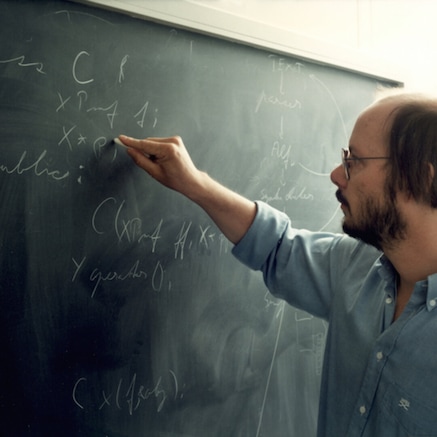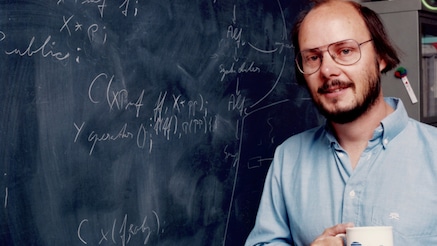Bjarne Stroustrup joined the 1127 Computing Science Research Center of AT&T Bell Laboratories in 1979. Strongly influenced by the object-oriented model of the Simula language (created by Dahl and Nygaard), he began work on developing class extensions to the C language so that developers could write software using a far higher level of abstraction and sophistication while retaining the efficiency of C.
Stroustrup said, “My initial aim for C++ was a language where I could write programs that were as elegant as Simula programs, yet as efficient as C programs.”[1] The first C++ language reference manual was published internally in 1984, and the C++ language was released commercially in 1985. C++ spread rapidly and became the dominant object-oriented programming language in the 1990s. The language remains one of the most widely used programming languages today.[2]
Stroustrup's career
Stroustrup received his PhD from the University of Aarhus in 1979, and joined the famed 1127 Computing Science Research Center, the birthplace of Unix and C, at Bell Labs in Murray Hill. The open, flexible research atmosphere encouraged him to consider adapting concepts from Simula, which he had used in his PhD thesis work, to C. He is quoted as saying, “When I joined, I was basically told to do something interesting...”[3]
After AT&T split up in 1996 into AT&T and Lucent, Stroustrup stayed with AT&T and was a founding member of AT&T Labs, where he was the head of the Large-Scale Programming Research Department until 2002. He then moved to the computer science department of Texas A&M. He is currently a visiting professor at Columbia University and a managing director in the Technology Division of Morgan Stanley.
During the three decades since the release of C++, Stroustrup has published more than 100 papers related to C++ and several books on C++, which have been translated into multiple languages. He has received numerous awards and honorary degrees, including the ACM’s Grace Hopper Award, election to the National Academy of Engineering, IEEE Fellow, Bell Labs Fellow and AT&T Fellow.
Legacy of C and C++
According to Stroustrup, “C and C++ became popular because they were flexible, cheap and more efficient than alternatives. C owes much of its initial popularity to the popularity of Unix. C++ owes much of its initial popularity to its high degree of compatibility with C.” He reminds us that “both C and C++ were invented in the Computer Science Research Center of Bell Labs in Murray Hill and found their initial serious use within Bell Labs and AT&T.”
C and C++, remarkably, remain two of the most widely used programming languages today and have influenced other languages, such as Java. Systems software, large-scale data processing systems, networking software and the like are programmed in C++. For example, the well-known MapReduce library at Google was created with C++. At Bell Labs, C++ continues to be used in a number of projects ranging from networking research to formal verification.
Stroustrup was awarded the 2015 Senior Dahl-Nygaard Prize for the design, implementation and evolution of the C++ programming language.
This prize, awarded by AITO, the Association Internationale pour les Technologies Objets, is considered the most prestigious in object-oriented computer science.[4]
Dennis Ritchie's archived web page
Stroustrup's C++ built upon the C programming language, developed by Dennis Ritchie at Bell Labs.
References
[1] gotw.ca/publications/c_family_interview.htm
[2]http://betanews.com/2014/07/22/why-c-is-the-perfect-choice-for-modern-app-development/ and The TIOBE index: http://www.tiobe.com/index.php/content/paperinfo/tpci/index.html
[3]“A History of C++: 1979−1991,” Bjarne Stroustrup. Proceedings ACM History of Programming Languages Conference (HOPL-2). ACM Sigplan Notices. Vol 28 No 3, pp. 271-298. March 1993. Also, History of Programming Languages (editors T.J. Begin and R.G. Gibson), Addison-Wesley, ISBN 1-201-89502-1. 1996.
[4]AITO is a non-profit association in Kaiserslautern, Germany, and promotes the advancement of research in object-oriented technology (primarily in Europe).


